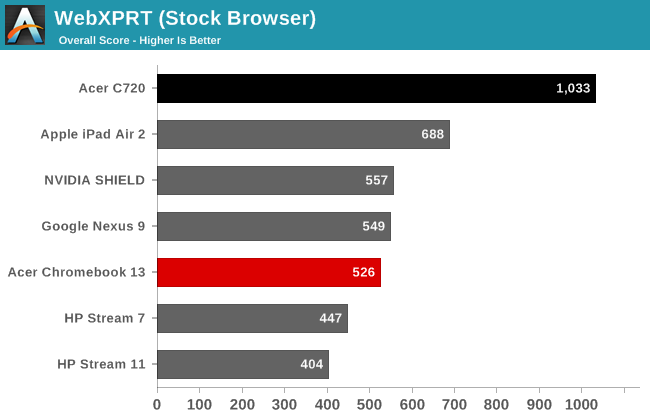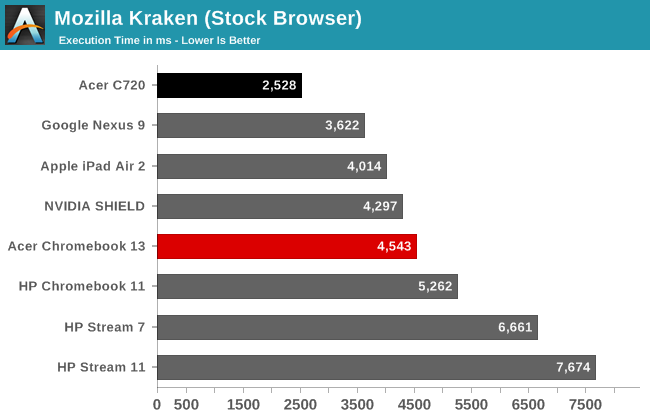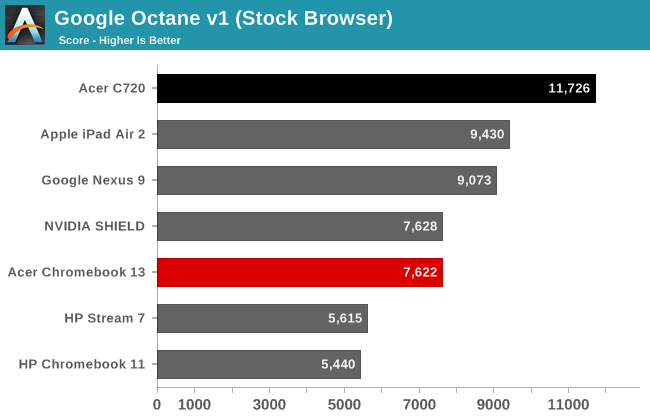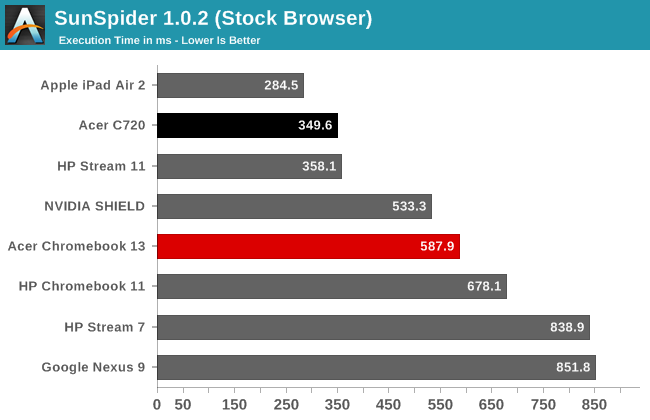Acer Chromebook 13: 1080p with Tegra K1
by Jarred Walton on January 23, 2015 10:00 AM ESTAcer Chromebook 13 Performance
I commented on the previous page that performance can at times feel lacking with the Chromebook 13. I think a large part of that comes from the NVIDIA Tegra K1 SoC, unfortunately. I’ve used an NVIDIA SHIELD, and going from an 8-inch tablet to a 13.3-inch laptop you’d think maybe they could push performance a bit more, but in most cases it’s a wash. Being a Chromebook (laptop), however, most sites will default to a heavier non-mobile view that can take a bit longer to fully process and display, and interactions with the laptop during this time can be very sluggish.
Benchmarks alone don’t necessarily convey the complete performance experience, so let me preface this section by saying that the older C720 was clearly more responsive in certain workloads. If you’ve never used the C720 then the Chromebook 13 won’t necessarily feel too slow, but switching between the two – or running tests simultaneously on both laptops – shows that while TK1 is more power friendly, the Haswell Celeron ends up being faster in nearly every computational workload. Even graphics doesn’t generally favor TK1, though the difference in screen resolution certainly plays a role as the C720 was only available with a 1366x768 panel.
For our performance testing of Chromebooks, we end up using a lot of tests that we run on tablets as there aren’t many Chromebook benchmarks. Also keep in mind that some of our Chromebook results are quite old (relatively speaking), so while we are running the latest build of Chrome OS on the C720 and CB13, the other Chromebooks were tested more than a year ago. We also aren’t able to test the older models on newer benchmarks, so some of our charts only have a few results. With that out of the way, here’s a quick look at performance.




| Additional Performance Results | ||
| Acer C720 | Acer CB13 | |
| CrXPRT | 96 | 55 |
| CrXPRT Battery (Hours) | 8.52 | 9.9 |
| OORT Online (WebGL) | 3270 | 4010 |
| Spacerocks (WebGL - FPS) | 18 | 30 |
| WiFi FTP Download (Mbps) | 100 | 115 |
And there’s the rub: no matter how much NVIDIA might like to say otherwise, when it comes to competing with Intel’s Core architecture there’s still a huge performance gap on the CPU side of the fence. If we were talking about a 10-20% difference, you could say I’m splitting hairs, but the C720 is well over 50% faster in all the non-graphics workloads, and in a few cases it’s close to twice as fast. Given we’re not even talking about particularly speedy processors to begin with – the Celeron 2955U is literally Intel’s “slowest” Haswell processor – a 50-100% improvement in performance is something you will notice.
Just typing in Google Docs – or heaven forbid, Microsoft’s Office 365 Word online, which can feel a bit like a pig even on a fast desktop PC – the experience can be anywhere from a bit laggy on the Chromebook 13 to downright slow. Open up a long Reddit page or other complex website and again performance starts to matter. I’m enough of a power user to appreciate added performance, even on a budget Chromebook, and the upcoming Chromebook 15 will certainly be interesting to look at.
Also of interest is the WiFi performance testing. Using my 3x3 802.11ac router and a 5GHz connection for both Chromebooks (though the C720 is only 802.11n), the two Chromebooks end up delivering pretty similar WiFi results. The Chromebook 13 is technically faster with its 1x1 802.11ac adapter, but while that should in theory allow well over 200Mbps of real-world throughput, in testing it topped out at 115Mbps. The C720 on the other hand manages 100Mbps; I'm not sure if it has a 2x2 or 1x1 802.11n adapter, but the net result is a relatively small difference in throughput.
With all this talk of performance, it’s important to take a step back again and ask the question: what are you going to do on your Chromebook? For every task that I might run that can push the performance limitations a bit, there are plenty of options where a Chromebook works fine. Both the C720 and the CB13 handled 1080p YouTube videos without a problem, and if you want to store an MP4 video locally they also handle that fine. For everyday Gmail (or other web mail) and Internet surfing, the Chromebook 13 is definitely good enough. And again, the keyboard just has a good feel to it, so as I write this review I may at times want to switch to my desktop, but that’s only because I prefer the desktop version of Word to Google Docs, not because of the typing experience.










71 Comments
View All Comments
jhoff80 - Friday, January 23, 2015 - link
Personally, I really think that Windows 10 should come with a sort of "RT mode" that doesn't let a user run anything that doesn't come from the Windows Store to protect from this sort of thing. Make it a switch that only the admin can modify, and that'd help a lot. I actually was considering a Surface 2 for my parents for a while because of this very reason (and they only need Office and IE anyway).jimbo2779 - Friday, January 23, 2015 - link
That's actually a really good idea. It would be really useful for the people that have to"admin" for a computer owned by a family member or friend.nils_ - Sunday, January 25, 2015 - link
This is what apple does on OS X as well, at least the Yosemite I use for work. You can set in the security settings that things downloaded from the Internet can't be run without overriding it in the security settings.jabber - Friday, January 23, 2015 - link
You don't get viruses etc. from porn sites. That's turn of the century thinking. You get malware from legitimate download sites. I guess you haven't read the articles from HowToGeek where they found that all the main download sites are stuffing the software with junk.Thats why folks and family get infected all the while due to them downloading innocent software encrusted with malware laden installers.
http://www.howtogeek.com/207692/yes-every-freeware...
JarredWalton - Friday, January 23, 2015 - link
Okay, yes, you can get malware infections from non-porn activities, but looking for porn is also still a major source of problems. Particularly if someone looks for free stuff. But the toolbars and other addons are certainly bad as well.sonicmerlin - Sunday, January 25, 2015 - link
Maybe Microsoft should release windows RT laptops.coder543 - Friday, January 23, 2015 - link
You talk about those laptops like they're actually good. I wouldn't touch one of those 5400RPM hard drives with a 10-foot pole. The perceived performance of one of these chromebooks would absolutely crush all of those laptops you mentioned, just because of how glacially slow the hard drives would make them feel.The first laptop, where you replaced the hard drive with an SSD, is now at a total price of $400, which is roughly double the price of these Chromebooks. Of course, for more money, you can get a laptop with higher performance specs. This is how economies work. However, those are both 15.6" laptops as well, and 15 inch laptops are painfully large and bulky. 14" is as high as I could ever see myself purchasing, but 13.3" is a much more realistic "high end" for me in terms of size.
My Acer C720P also has no problems with productivity sans an active cloud connection. Google Drive / Docs can be used without an internet connection, and it most definitely has both USB 3.0 and a full HDMI port -- so I'm not sure what you're talking about there. The battery life on my C720P almost certainly stomps whatever cheap Windows laptops you bought as well.
To recap, Chromebooks are good because:
- They are significantly less expensive than any Windows laptop worth having (the Stream 11 and X205TA are the first *real* competitors to Chromebooks, because they have SSDs at Chromebook price points)
- They do have all of the connectivity you talked about, such as USB and HDMI
- You're able to do productive things without an internet connection thanks to HTML5's notion of offline web applications, plus Google's Native Client (NaCL) initiative that allows you to run near-native code on Chromebooks in a fully sandboxed environment, including some rather intense games (though not very many)
- Userproof: no malware, no crashing, no problems.
- Compact, portable form factor, with build quality that far exceeds the chintzy feel of sub $400 15.6" Windows laptops which literally feel like they're 95% air, and 5% plastic that's about to break.
I would *strongly* recommend buying a solid Chromebook (like the C720) and giving that a whirl. Your notions seem to be based on misconceptions and on the experiences gleaned from 10-seconds of clicking buttons on them at Best Buy while sneering at the Chromebooks.
JarredWalton - Friday, January 23, 2015 - link
Hey coder543, what "rather intense games" do you run on Chromebooks in a sandboxed environment? Serious question -- I'd love to have something a bit more demanding to test than WebGL portals! And if I can get something with a freaking benchmark in it, I'd be ecstatic. :-)jabber - Friday, January 23, 2015 - link
I took my little 11" Samsung Chromebook on my three week vacation to Canada a few months ago. I just charged it up and didnt take the charger with me as I reckoned it would last. Well I used it most days for checking upon stuff, was no hassle to carry around and it lasted the whole vacation...with an hour to spare on the battery. No cheap nasty $300 Windows laptop would have done that.zodiacfml - Friday, January 23, 2015 - link
Plenty laptops these days with a slow but big Intel CPU around $200. It might be pretty bad in terms of battery life but the speed will be appreciated all the time. I'm typing on an Asus with a Celeron 1000M which is snappy for web browsing.